FIDE Grand Swiss 2025, Round 7: Bluebaum and Sarin seize the lead, as World Champion continues to struggle
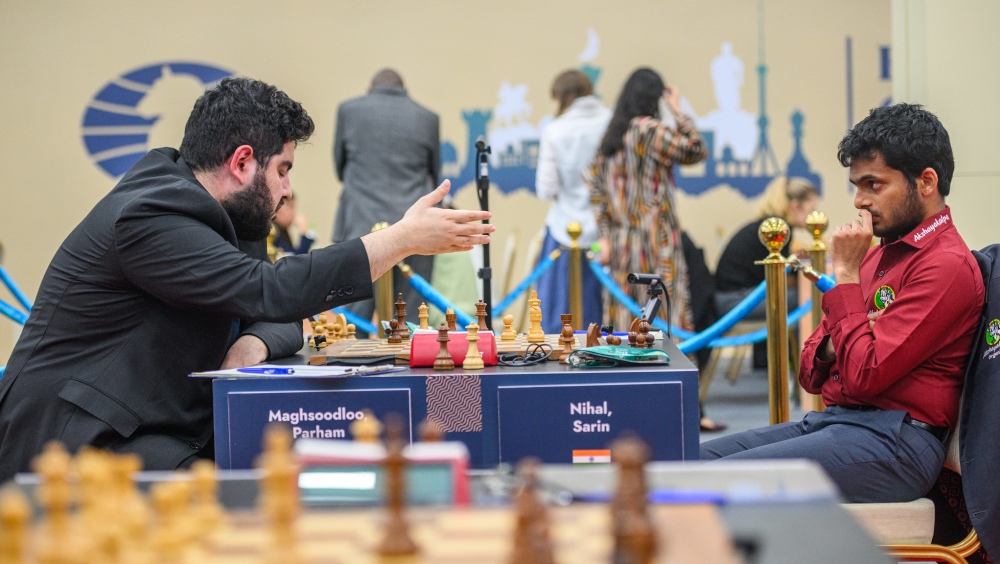
Day seven of the FIDE Grand Swiss 2025 brought a dramatic shake-up at the top, as Matthias Bluebaum and Nihal Sarin seized the lead in the Open with 5.5/7. In the Women’s Grand Swiss, Vaishali is again the sole leader after a victory over Guo Qi and is on 6/7. The round started with Señora Auxi Del Olmo – the mayor of the Spanish city of Linares – making the first move on board one in the Women’s tournament, in the game Stefanova – Lagno. Del Olmo was accompanied by Javier Ochoa de Echaguen, the President of the Spanish Chess Federation. Linares, a city synonymous with chess history, is set to be the stage for the FIDE World Women’s Team Championship 2025, which will run from 17 to 24 November. After leading for four straight rounds, Parham Maghsoodloo suffered his first loss in the tournament. He was defeated in the Slav by Nihal Sarin, who played as White. The Iranian maintained parity roughly until move 30, when time trouble caused him to slip. White is a pawn up and has two runners on the queenside, but it’s not easy. Black has pressure along the e-file, and the queen-pawn battery pins the g3-square, leaving White’s king exposed. The best choice for White here was to play 34.Rc7 which puts pressure on Black’s seventh rank but also cuts the queen pin on g3. But Sarin was also in time trouble and instead opted for 34.Nxg6? which was met by the immediate 34…Qg3+ and now the position is even. After 35.Kf1 Nf6 36.Rxf6! gxf6 37.Nxh4 the opponents reached the final critical position: Instead of taking on h4 and proceeding with Rc3, Maghsoodloo played 37…Rxb3?? which allowed White to evict the black queen with 38.Nf5! the rest was an easy ride for Nihal. After Qf4 39.Qxd5 Rb1+ 40.Kf2 Re5 41.Qd8+ Kh7 42.Qxf6 threatening checkmate on g7, Black resigned, catapulting Nihal Sarin to the shared lead in the tournament. Things also cleared up among the other four players who – like Sarin – entered the round with 4.5 points. Arjun Erigaisi lost as White to Germany’s Matthias Bluebaum. Playing against the Catalan, Erigaisi made several unforced errors, leading to a completely lost position as early as move 26. Black’s pieces are more active and he has potential discovered attacks along the d-file. Instead of moving his d2-bishop to safety with 26.Bf4 with a slightly inferior but defendable position, Erigaisi blundered with 26.Qxa7?? which was met by a quick 26…Ba8! The rook is attacking the queen, but the real target is the d2-bishop; wherever White puts his queen, she will be attacked in the next move by the d5-knight, opening the file for the rook to capture the bishop on d2. This victory launched Bluebaum to shared first place, together with Sarin. On board three, Anish Giri split a point with Abhimanyu Mishra in the King’s Indian. Despite Giri securing an extra pawn towards the end, it was a drawn rook endgame and Mishra held it without trouble. In other notable results of the round, Alireza Firouzja won as White against Uzbekistan’s Nodirbek Yakubboev. Uzbekistan’s pride was saved by another Nodirbek – Abdusattorov, who defeated Iranian Amin Tabatabaei in the Italian Game. Abdusattorov was better for most of the game, advancing his d-pawn before an effective finish: Out of many winning options Nodirbek chose the most spectacular: 36.Bd5! leaving Black paralysed, as he can either take the bishop or lose a knight on c4. Either way, the outcome was certain: 36…Bxd5 37.Rb8 and Black can’t prevent the queen promotion on c8. For his victory, Abdusattorov was declared the player of the day in the Open. In one of the most anticipated duels of the day, Hans Niemann defeated the 14-year-old Turkish prodigy Yagiz Kaan Erdogmus in a double-edged Petrov. The opponents traded mistakes in the critical position on move 13. Both sides are in attack mode. Instead of 14.Bxc6! Hans opted for the weaker 14.h3 giving a chance to Black to play sharp with 14…fxg2 and in case of 15.hxg4 then Qh4 16.Kxg2 Bd6 with a very uncomfortable position for White. But Erdogmus played 14…Bh5 allowing White to proceed with the original plan: 15.Bxc6 bxc6? 15…Qc6 was better. 16.Re5 Qg6 17.g3 Bd6 18.Nb3! Black can’t take on d5 because of 18…Bxd5?? 19.Nc5 with a threat of mate with Qa6-b7. Niemann converted this winning position with surgical precision forcing Black’s resignation on move 27. Rating favourite Praggnanandhaa and 2023 Grand Swiss winner Gujrathi both won their games today, maintaining close proximity to the top. But the World Champion, Gukesh D, continues to sink. He lost again today. A third consecutive loss for Gukesh Playing as Black against Turkey’s rising star, Ediz Gurel, the World Champion managed to gain a slight advantage in the middlegame but then blundered away. With a third loss in a row, Gukesh has completely sunk in the tournament. The Women’s tournament Vaishali R seized the top spot again, emerging as the sole leader in the tournament. Playing with the white pieces against China’s Guo Qi, Vaishali grabbed the initiative in the Petrov, opting for a sharp approach. Vaishali is attacking. Here Black had to decide where to retreat her queen. The best option was 21…Qg4 transferring her most powerful piece to the kingside and maintaining equality. Guo, however, moved her queen to a passive position with 21…Qa6? and after 22.Bxe7 (even better was 22.Nh5 immediately) 22…Nxe7 23.f4 h5? 24.f5! h4 25.Nh5 Rcc8 26.f6! White got to the black king. A few moves later Guo resigned facing the imminent checkmate. Another confident performance by Vaishali, who is on a path to defend her 2023 Grand Swiss title. The win puts her alone at the top and earns her player of the day honours. Vaishali’s co-leader from day six, Kateryna Lagno, drew with the black pieces on board one against former Women’s World Champion Antoaneta Stefanova. In the Four Knights game neither side secured any advantage throughout and a draw was agreed on move
FIDE Chess in Education Commission (EDU) courses & events September–November 2025

Dear Member Federations, FIDE’s Chess in Education Commission continues to accelerate its provision of training for Lecturers and Teachers of Educational Chess, offering a series of high-level online and in-person opportunities in autumn 2025. The Preparation of Lecturers (PoL) course leads to the FIDE titles of Lead School Instructor (LSI) and Senior Lead Instructor (SLI). It is intended primarily for those who will train teachers, helping to expand the global community of educators capable of teaching chess in an educational way. The Preparation of Teachers (PoT) course leads to the FIDE title of School Instructor (SI). This 3-day (15-hour) training equips participants with pedagogical methods, digital tools, and practical strategies for teaching chess as an educational tool. Alongside these core courses, EDU also supports events that showcase innovation and best practices in the field, such as the “Every Lesson Counts” masterclasses in London. The schedule of the FIDE EDU upcoming courses and events is below: For more details visit the Chess in Education website: edu.fide.com/ To join, please register via the following links: 29th PoT online course – Sept 26-28Register: cloud.fide.com/s/qD7RBPYYAXmMLjr First Arabic PoT online course – Oct 3-5Register: cloud.fide.com/s/gXzeznmz9Q6ZHeA French PoT online course – Oct 24-26Register: cloud.fide.com/s/SYZqgJj5yKrbaXc Every Lesson Counts Masterclasses, London – Oct 11-12 Join us in London, Mindsports Centre for a transformative weekend on October 11-12, dedicated to exploring chess as a powerful educational tool. Whether you’re already teaching chess or simply curious about its potential, this event offers fresh strategies and practical resources to enrich your teaching practice and engage students in new ways. No prior chess experience is required – just a passion for helping children learn and grow. The event is funded by FIDE and the International Olympic Committee, underscoring its global significance and commitment to educational excellence. Organised in collaboration with the FIDE Chess in Education Commission and the ECU Education Commission, the weekend will bring together teachers, tutors, and education specialists to discover how chess can foster lifelong skills. Through a series of interactive Masterclasses, participants will gain hands-on tools and insights that can be immediately applied in the classroom. You’ll also receive a booklet on all Masterclass materials and enjoy opportunities to connect with fellow educators over lunch and refreshments, which are included with your ticket. With only 60 places available on a first-come, first-served basis, this is a rare opportunity to learn from the best and bring the benefits of chess into your educational practice. Tickets: tickettailor.com/events/chessplus/1842399 Our dedicated Chess in Education website has further details: edu.fide.com/
FIDE Grand Swiss 2025, Round 6: World Champion Gukesh suffers second defeat in a row
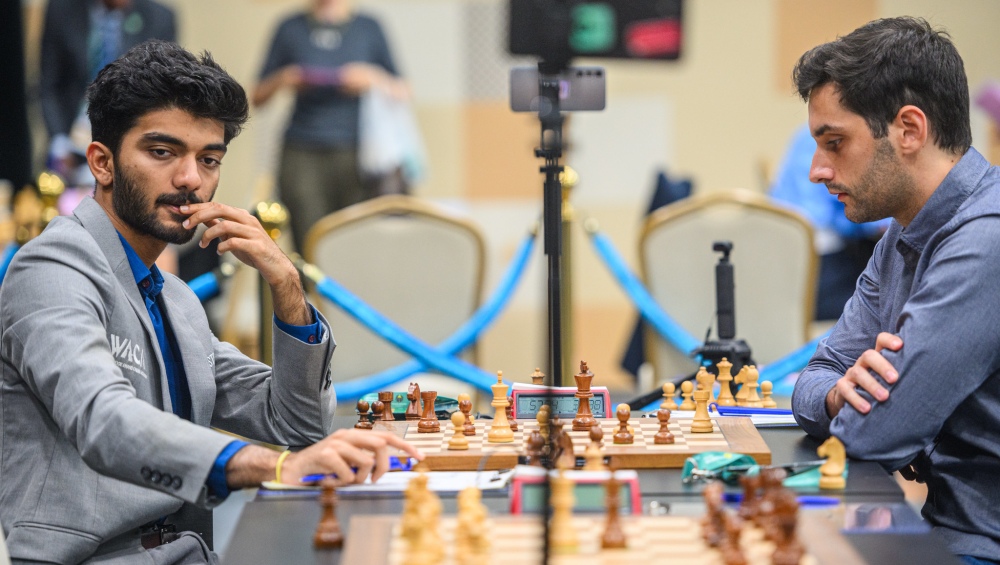
After losing in round five, another shock for World Champion Gukesh D who made a crucial mistake in a drawn endgame. Parham Maghsoodloo retains a half-point lead in the Open, while Kateryna Lagno ties Vaishali Rameshbabu at the top of the Women’s tournament. Round six marked the end of the first stage of the 2025 FIDE Grand Swiss, with a rest day scheduled for Wednesday. For many players, a win – or at least avoiding defeat – before the break is crucial, offering a chance to regroup and refocus. But not all could find that comfort. On board one, in a challenge for the leading position in the tournament, world’s fifth highest-rated player, Arjun Erigaisi, tried to take down Parham Maghsoodloo with the black pieces. In the Semi-Tarrasch, Erigaisi put more pressure early in the game, but it ended with exchanges of all the heavy and light pieces, leading to a drawn pawn endgame. On board two, Matthias Bluebaum and Abhimanyu Mishra – both trailing Maghsoodloo by half a point at the start of the day – played a draw in a sharp Grünfeld. In this game, both players made several temporary piece “offers” to one another, trying to provoke a blunder. In this position Bluebaum made a surprising move – 14.Bh6! White gives up a bishop, but only for one move: 14…Bxh6 15.Rd1 and Black’s d7-bishop is falling. 15…0-0 16.Bxd7 Qe7 17.0-0 Rad8 18.e5 Nc4 Now Black offers a knight for free and White has no better option but to take it. 19.Qxc4 Rxd7 Recapturing a light piece. 20.h4 Kh8 21.g3 and now Black tempts White with 21…Bd2 22.Nd4! Another “free” piece for Black. 22…cxd4 23.Rxd2 dxc3 24.Qxc3 Rxd2 25.Qxd2 and the position is even. Given that none of the other top players chasing Maghsoodloo won, the Iranian continues to be in sole lead in the tournament, half a point ahead of all. Anish Giri had a great day today, defeating Marc’Andria Maurizzi in what was almost a miniature, lasting just 27 moves. Playing the Najdorf, Giri took the initiative on the queenside, making a rapid pawn advance. White just played 19.f5, trying to counter Black’s advance on the queenside, but after 19…a4! Giri’s attack unfolds much faster. 20.fxe6 fxe6 21.bx4 Rxa4 22.Bh3? Attacking the e6-pawn, but completely ignoring Black’s main threat. 22…b3! – Now White’s king is under fire and Black is winning. 23.c3 Nc5 24.Qe2 Qc6 25.Kd2 0-0 Black moves his king to safety. 26.Rhf1 Rxf1 27.Qxf1 Qxe4 White is only a pawn down, but his king is exposed and pieces in the way that there is no good move left to play. Faced with this, Maurizzi chose to resign. This victory propelled Giri to the top group, half a point behind the leader Maghsoodloo. In a shocking twist of the day, the World Champion was stunned again, losing his second game in a row. Playing against Nikolas Theodorou of Greece in the Petrov, Gukesh had a solid position and was putting pressure on Black. However, Theodorou put up a stubborn resistance. Despite losing a pawn he gradually equalised, liquidating into a balanced rook endgame. Here White had to demonstrate accuracy with the only move 34.Kf2!, bringing his king closer to Black’s connected passers. However, Gukesh played 34.Ra7+?? after which Black’s pawns are unstoppable. A dire turn for the World Champion, who now has 3/6 and finds himself far away from the top. Hans Niemann was declared the player of the day following this victory against Uzbekistan’s Shamsiddin Vokhidov. In a very sharp position, with his king under attack, Hans Niemann (Black) found the best way to counter with the timely exchange sacrifice and ended up winning. 26…Rxf5! 27.Nxf5 Rxf5 28.Qg3?! Qa4 29.a3 f2! 30.Rhf1 Rf3! Black is now winning. Five moves down the road Vokhidov threw in the towel. The Women’s event Vaishali Rameshbabu and Kateryna Lagno share first place, with 5/6. They are followed by Antoaneta Stefanova and Guo Qi, half a point behind. Vaishali continued in strong form as she defeated Ulviyya Fataliyeva with the black pieces in the Bishop’s Opening, securing her place at the top. Despite surprising Black with her opening choice, Fataliyeva failed to get any advantage and allowed Vaishali to take the initiative. By move 23, Fataliyeva was already losing, after Black pushed her pawn to h3 to weaken the king’s fortress. Black has a towering advantage. Now Vaishali goes for the key blow: 24…a5! 25.Bxa5 Rxc5 26.Qe1 Bg4! A double attack on the pawn that covers the big diagonal. The only way to protect it is 27.Qe2 but after 27…Rxa5 28.fxg4 Ra3 White’s position is completely shattered. A pale performance by Fataliyeva, who had been having an excellent tournament thus far. In another duel of the leaders, on board one, Kateryna Lagno missed several opportunities to take down Dinara Wagner, but eventually ended up winning. Playing the Sicilian, Wagner allowed Lagno to win a pawn early in the opening. After trading multiple inaccuracies, the opponents reached the following critical position: Black’s pawn is just one step away from promotion, but her position is tricky as White is holding and still has two runners on the queenside. According to engines, the best option for Black was to play 51…Re3 52.Rxg2 Ke7 giving up her last pawn but hoping to hold with precise play. However, Wagner faltered here with 51…Bd4?? After 52.Bxe2 g1=Q 53.Rxg1 Bxg1 White is just two pawns up and winning, as Black’s king fails to reach the queenside. After a few more moves, Wagner had to resign, sending Lagno to shared first with Vaishali. In the duel between two former World Champions, Antoaneta Stefanova defeated Tan Zhongyi with the black pieces. For the following game, Stefanova was declared the player of round six. Black is winning. Many ways “lead to Rome” here, but Stefanova chose the most effective one: 25…Nh4!!, completely smashing White’s position. The rest was a smooth sail for Antoaneta, who forced capitulation on move 40. So far, Stefanova – who was the Women’s World
FIDE World Senior Championship 2025: Record participation and increased prize fund

The 33rd FIDE World Senior Championship, to be held in Gallipoli, Puglia, Italy, from October 20 (arrival) to November 2 (departure), has already set a new record, with more than 430 players registered. The championships will be played as 11-round Swiss-system tournaments with classical time control (90 minutes plus a 30-second increment per move). Four categories will be featured: Open and Women’s sections for the 50+ and 65+ age groups. Players must have reached the respective age of 50 or 65 by December 31, 2025. In recognition of the record turnout, FIDE has boosted the total prize fund from €43,000 to €50,000. The category winners will receive: €5,000 (Open 50+), €2,100 (Women 50+), €3,000 (Open 65+), and €1,500 (Women 65+). In addition, the champions will be awarded free entry and complimentary hotel accommodation at the 3rd Cap Negret Senior Open (50+ and 65+), taking place from November 8–16, 2025, in Altea, Alicante, Spain. The special prizes for players aged 75 and above have also been increased. Several side activities will complement the main event, including two FIDE-rated blitz tournaments. Invitation letter, regulations, accommodation, prizes (PDF) Official website: worldseniorchampionship2025.com/ E-mail: worldsenior@fide.com
FIDE Grand Swiss 2025, Day 5: A round of piece sacrifices and surprises
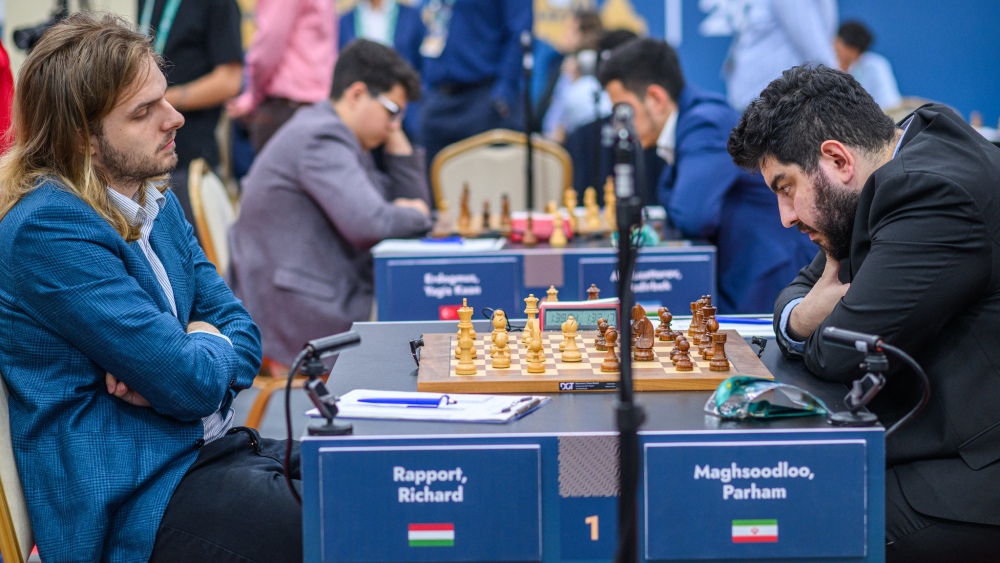
Iran’s Parham Maghsoodloo maintains the sole lead after a victory over Richard Rapport. Meanwhile, both Gukesh and Praggnanandhaa suffered shock defeats. In the Women’s event, Wagner and Fataliyeva joined Vaishali and Lagno at the top. The games of round five of the 2025 FIDE Grand Swiss were marked by piece sacrifices, blunders, and several even endgames thrown away. The round started with former FIDE World Champion Rustam Kasimdzhanov making the first move in the game between Abdusattorov and Yagiz Kaan Erdogmus, which ended in a late draw after the Uzbek star failed to convert a better position. Parham Maghsoodloo continues to lead the Open tournament after defeating Richard Rapport on board one in the London system. The position was largely even until the endgame, when Rapport miscalculated and lost. There were two big surprises in the results on the top boards. Playing on board two, Praggnanandhaa lost to Matthias Bluebaum in the Queen’s Pawn Opening. Playing as Black, the Indian found himself in a tense endgame and overlooked a pawn on the queenside which ended up costing him a point. That’s now a third consecutive victory for Bluebaum, who is having a great event so far. The day also saw the World Champion Gukesh D stunned by Abhimanyu Mishra. In the Giuoco Piano, Gukesh overstretched himself in the early stages of the game. Black has played 12…g4? allowing White a piece sacrifice which offered him more than sufficient compensation with 13.exd6 gxf3 14.dxc7 Qe7 15.Nf3 In the moves that followed, Mishra was not precise in executing his advantage and even allowed Gukesh to equalise. However, in another critical moment, Gukesh misplayed again: Black’s best choice was to play 36…Rd3 and force a draw with checks. Instead, Gukesh blundered with 36…Ne2?? after which he is lost as his king is in a mating net. 37.Kf1 Nf4 38.Bd4 Rf3+ 39.Ke1 Nd3+ 40.Kd2 Nxe5 41.Bxe5 Kxe5 42.Rg5+ Ke6 43.Rgxd5 And now White has a passer on the g-file in addition to the c7-pawn, which has pinned one of Black’s rooks to the eighth rank. Gukesh played on but had to resign in the end. A major early upset for the World Champion. In another exciting game, Arjun Erigaisi – playing as White – defeated Nikita Vitiugov in the Classical Line of the Catalan. Black traded her queen for two rooks, but the resulting position was slightly better for White. Disaster struck Vitiugov on move 24. Here Vitiugov blundered with 24…Rb5?? Giving up a pawn on a7 and allowing White to take the initiative. 25.Qxa7 Bd3 26.Bxf6 gxf6 Doubling Black’s pawns and then 27.Qd4! – attacking the bishop and pinning f6. 27…Bg6 28.Nd5 and White is winning. After blundering in the endgame against Maghsoodloo in round three, Alireza Firouzja had the favour returned in today’s game, as he managed to swing a drawn endgame thanks to Sam Shankland blundering in one move. It’s not easy for White to hold as Black is pressing. 47.Ke2 was the only move, but Sam had to foresee that in the line 42…d4 43.exd4 Ke4 44.b5! Kxd4 45.Kf3! Kc4 46.Ke4 Kb4 47.Kd5 Kxa4 48.Kc6! White maintains equality, reminiscent of the famous Botvinnik – Euwe endgame (Groningen, 1946). Instead, Shankland played 47.bxa5 bxa5 48.Kd4 and after 48…Kf3 he could not prevent the fall of the h2-pawn. In another surprise of the round, Marc’Andria Maurizzi defeated Vincent Keymer in the Sicilian. The position was even until the endgame when Keymer blundered in one move and lost. The Women’s event Day five saw tournament leaders Vaishali Rameshbabu and Kateryna Lagno face off on board one. In the Ruy Lopez, after three and a half hours of play, neither side found a way to tip the balance and a draw was agreed on move 35. Playing with the black pieces against Irina Bulmaga, Dinara Wagner opted for the Najdorf. After Irina’s inaccuracy on move seventeen, Dinara got an edge thanks to better coordination of her bishops and rooks. Eventually, Bulmaga miscalculated, entering an endgame with opposite-coloured bishops a pawn down which was absolutely hopeless for White. 44…b6! Black creates the second passer on the a-file. Since the passed pawns are too far apart, the opposite-coloured bishops do not rescue White. Fifteen moves down the road, Irina capitulated. 0-1 Ulviyya Fataliyeva defeated the former World Champion Alexandra Kosteniuk, who blundered in the endgame, walking into a mating net. With their victories, Wagner and Fataliyeva joined Vaishali and Lagno at the top. On board two, former Women’s World Champion Antoaneta Stefanova drew with Uzbekistan’s Afruza Khamdamova in the King’s Pawn Opening. Stefanova had more initiative but could not make a tangible advantage. In other notable results on the top boards, Tan defeated Elina Danielian as Black, and Bibisara Assaubayeva prevailed over Nurgyul Salimova after snatching a pawn in the middlegame and forcing a won rook endgame. Olga Girya toppled the US Women’s Champion Carissa Yip with the black pieces. After a strong start in the first two rounds, Olga Badelka has now hit a rough patch. Following an unfortunate loss to Vaishali in round three, she made a draw with Tsolakidou in round four but lost today to Song Yuxin. The rating favourite in the Women’s event, Anna Muzychuk, scored her first victory in the tournament. Playing as White, she defeated India’s Vantika Agrawal in the Closed Sicilian. Agrawal made a blunder in a tense position: Here, Black should have continued with 29…Rb8 and then if 30.Rc7 she should have played Bb8, defending in a difficult position. Instead, she went for a rook exchange which turned out to be fatal. 29…Rxc1 30.Rxc1 Rb8 31.Rc5!! Winning a pawn as Agrawal apparently overlooked the checkmate on the eighth rank. 31…g5 32.Rxb5 Not only has White created an extra pawn on the b-file, but her centralised rook and pieces caused further chaos for Black. 1-0. Following a shocking loss in round one, Anna struggled in the tournament, with three consecutive draws. Maybe this victory will mark a turning point in her tournament. With six rounds to go,
Women’s Chess Marathon 2025 – A Summary

A month of global connection This August, the FIDE Commission for Women’s Chess led the Women’s Chess Marathon – a worldwide celebration held within FIDE Women’s Month and the 2025 Social Chess Year. Each week, a different continent became the stage for tournaments, workshops, and conversations, always in close cooperation with local organizers. Over 1,000 participants joined the Marathon worldwide, showing just how needed these initiatives are. The Marathon was not only about competition: it created safe, inspiring spaces where girls and women could feel supported, build confidence, and find role models — all while celebrating the global community that chess represents. Week 1 – Americas: Diversity and community The Marathon began in the Americas, where events highlighted how chess can build safe, supportive spaces for women and girls while celebrating the continent’s diversity. An online Arbiter’s Seminar opened the week, giving participants tools to strengthen their involvement in chess beyond the board. In the Dominican Republic, the Women’s Tournament of Santiago formed part of the Chess for Girls in a Safe Environment initiative, emphasizing the importance of protection and opportunity for young players. In Venezuela, a Women’s Chess Festival combined a rapid tournament with engaging talks and discussions. And in Puerto Rico, the regional closing event was hosted at the Casa del Ajedrez in Caguas. Its highlight was a simultaneous exhibition with the Women’s Olympic Team – WIM Danitza Vázquez Maccarini, WCM Yanira Rivera Negrón, WCM Coralys M. Alvarado Pérez, WCM Gabriela Vera, joined by guest master WFM Rinelly Comas Colón – inspiring the next generation. Together, these events showed how women’s chess in the Americas thrives when communities come together, creating opportunities not only for competition but also for learning and mentorship. Big appreciation goes to the Chess Confederation for the Americas and to our Commission members Sarai Sánchez and Francisco Cruz, whose support was invaluable. Week 2 – Africa: Meeting role models, building confidence The second week highlighted Africa, where chess became a platform for confidence, growth, and record-breaking participation in South Africa and Zambia. A special highlight of this week was the presence of WGM Dana Reizniece, Deputy Chair of the FIDE Management Board, who attended both events. Her encouragement left a strong impression on participants, many of whom were meeting a chess leader of her stature for the first time. In South Africa, the Queen’s Chess Training Workshop gathered girls for skills development, with sessions by FT Eric Takawira, FI Reuben Salimu, and Nadzeya Krauchuk. Dana Reizniece opened the event with her lecture Making it in Chess and later led a simultaneous exhibition at Louwville High School. The week concluded with a Women’s Month Blitz Tournament. Just days later in Zambia, history was made: the Rapid Women’s Chess Championship brought together 88 female players, the largest number ever for a women’s championship in the country. Here too, participants benefited from presence of Dana Reizniece, as she delivered a motivational talk that encouraged them to pursue their ambitions in chess and beyond. Special thank you to the Chess Federations of South Africa and Zambia for making these groundbreaking events possible. Week 3 – Asia & Australia: Inspiration across generations The third week of the Marathon showed how women’s chess flourishes when communities rally behind it. In Nepal, the Himalayan Chess Academy staged one of the largest women’s and girls’ tournaments in the country’s history, drawing 142 players aged between 5 and 67. The tournament also received extraordinary backing from across sports, culture, and education. Distinguished guests such as Palesha Goverdhan, bronze medalist at the Paris 2024 Paralympics, lent their support, underscoring how much potential girls and women in chess hold — and how vital it is to surround them with encouragement and recognition. Meanwhile in Australia, celebrations stretched across schools and generations. From the Korowa Anglican Girls School Zonal Tournament with 120 participants, to motivational talks by Angelica Zivanovic, and a lecture with simultaneous exhibition by WGM Julia Ryjanova, girls experienced both high-level chess and inspiring stories. The events also honoured Leonid Sandler, whose 25 years of coaching at Lauriston Girls School have left a remarkable legacy. Altogether, the Australian program blended large-scale participation with the impact of dedicated role models, creating a true celebration of women’s chess. Special thanks go to Monalisha Khamboo and Leonid Sandler, whose dedication and long-term support continue to strengthen women’s chess across the region. Week 4 – Europe: The power of women’s voices The Marathon concluded in Europe with events that emphasized the importance of women’s voices in shaping the future of chess. In Italy, the conference Power Moves: Women Shaping Chess was hosted at Campus San Francesco in Conegliano. Speakers included Anastasia Sorokina, Chair of the FIDE Commission for Women’s Chess, WGM Aleksandra Dimitrijević, IA Franca Dapiran, and Veronika Goi, moderated by Deborah Pavei. Their reflections touched on leadership, education, and inclusion in chess communities. This event was especially meaningful for our Commission because it featured Anastasia Sorokina, Chair of our Commission. A passionate advocate for girls and women in chess, she works tirelessly to make the chess world welcoming and inclusive for everyone. Part of the celebration in Italy was a Girls & Boys Blitz Team Tournament, encouraging teamwork and friendly competition and teaching about inclusion in a fun way. In Portugal, the Women’s Talks in Matosinhos followed the National Women’s Semi-Rapid Championship, won by Marta Almeida. The panel featured Susana Gonçalves (WOM member and President of Chess2All), WIM Jussara Chaves, Ana Inês Silva, Isabel Nunes, Luísa Salgueiro (Mayor of Matosinhos), and André Vögtlin, Chair of the FIDE Social Commission. His presence added particular significance to the closing event of the Marathon, linking it to the wider celebration of FIDE Women’s Month within the 2025 Social Chess Year. Special thanks to the Italian and Portuguese Chess Federations and all local partners for making these meaningful events possible. Beyond the official events While each week focused on a different continent, the Marathon reached far beyond its official program. Independent organizers joined the global celebrations and hosted their own tournaments, talks, and online activities to stand with the initiative – from Kenya to Canada. These efforts proved that when given a platform, communities are eager to create spaces where women and girls feel welcome in chess. Women’s Marathon The Women’s Marathon showed that when women and girls are given space in chess, they bring diversity, inspire new generations, and strengthen communities. From arbiters and organizers to players, coaches,
FIDE Grand Swiss 2025, Day 4: Lagno joins Vaishali at the top as Maghsoodloo holds on to his lead
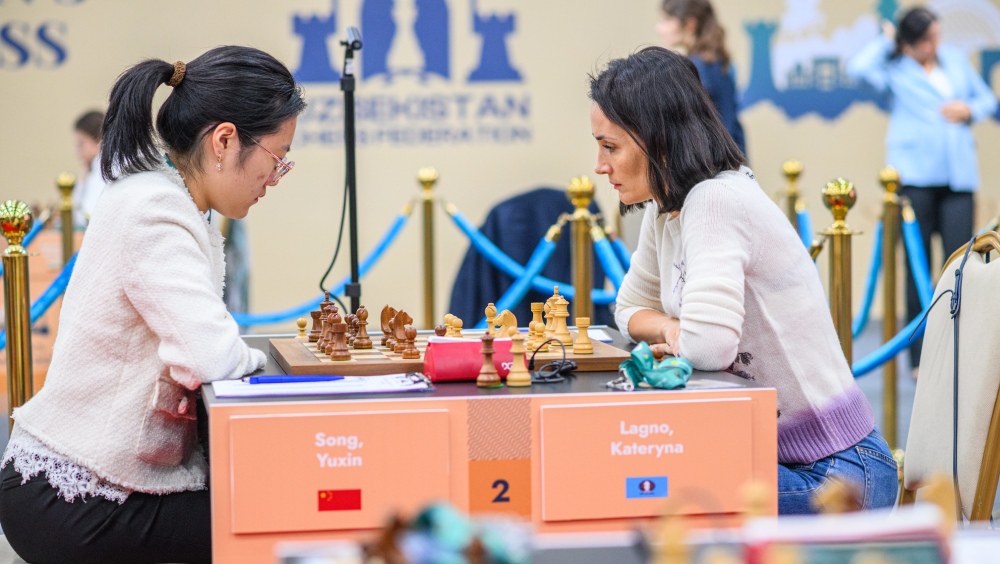
A quiet day in Samarkand as most of the games on the top boards in both the Open and the Women’s event finished in a draw. With three and a half points, Iranian Parham Maghsoodloo continues to lead in the Open, chased by as many as 13 players who are half a point behind. In the Women’s tournament, Kateryna Lagno scored a convincing victory to share first place with Vaishali Rameshbabu. On board one in the Open tournament, leader Parham Maghsoodloo played as White against Uzbekistan’s top player Nodirbek Abdusattorov. A tense and complicated game developed in the Queen’s Gambit Accepted, with both having to play with high precision and finesse. After exactly four and a half hours of play, a draw was agreed with only the two kings left on the board. On board two, Praggnanandhaa could not find a way to convert his extra pawn against Abhimanyu Mishra, known as the youngest player in history to become a Grandmaster (at 12 years, 4 months, and 25 days). Mishra opted for 36…Re7? Instead, he should have played 36…Nb5 (White cannot take on b7 as Black takes the d4-pawn with a check and then send the rook to the second rank with another check, clearing out White’s back ranks.) 37.Rd7 Protecting the d5-pawn, and now 37…Re7 38.Rd5 Nc3 and Black has better chances of holding. After 37.Rxe7 Kxe7 38.f5! Kf6 39.fxg6 Kxg6 40.Kf4 White is winning according to chess engines. However, in the moves that followed, Praggnanandhaa could not make any progress and had to settle for a draw. An exciting game took place on board five, in a German showdown between Vincent Keymer and Frederik Svane. A sharp position arose in the Open Variation of Ruy Lopez. In this position, Svane played 24…c5, looking to build up pressure on White. But this seemingly logical move was a mistake which Keymer was quick to spot: 25.Bxc5!! Qxc5 26.Rxd5 Qc7. This forced line led to a very uncomfortable position for Black. But Keymer wasn’t precise in his conversion, and the position was soon even. Eventually, White emerged a pawn up in a sharp endgame, but the position was even, with threats for both sides. However, at some point, Svane started losing his way and allowed White to transpose into a winning minor piece endgame with a remote passer on the queenside. Slowly, but surely, Keymer steered the game in his favour and clinched the full point. There were other missed chances among the top players. The victor of the previous Grand Swiss, Vidit Santosh Gujrathi had a winning endgame as Black against Vasyl Ivanchuk. In the Scotch, approaching the endgame, Ivanchuk went for a pawn push which significantly weakened his position and ended up costing him a pawn. Vidit forced a winning rook endgame, but completely misplayed it in the end, allowing Ivanchuk to save half a point. World Champion Gukesh D split a point with compatriot Arjun Erigaisi in the Catalan. Following a shocking loss late on day three, Alireza Firouzja split a point with Szymon Gumularz of Poland after just 25 moves. Giri had a very quick draw as Black against Cheparinov (the first game of the round to finish, after an hour and a half of play), as did Salem and Aronian. MarcAndria Maurizzi prevailed over Maxime-Vachier Lagrave in a hard-fought French derby which stood out. In the Advance Caro-Kann, MVL – playing as White – emerged with two minor pieces for a rook. However, his young opponent had two dangerous advanced passers on the queenside. The position was in balance, but the younger of the two Frenchmen overestimated his chances and grabbed the a4-pawn, which gave White a crushing attack. At the critical moment of the game, MVL – known for his precise calculation – did not manage to find the winning idea. MVL played 30.Bh6?? and after 30…c2! the position was even again. White could have finished it off with 30.Qh4! The point is that 30…Qxe5 (the best move for Black) fails to the elegant 31.Nc2!!, with the idea of 32.Bd4, winning. Maxime’s troubles did not end there. In the ensuing play both opponents traded mistakes but MVL was last to err, capitulating on move 38. The day’s biggest upset came from Divya Deshmukh, who stunned Africa’s top-rated player Bassem Amin. Playing against the Sicilian, the Egyptian created a slightly better position from the opening but then began overspreading, which backfired, leading to a defeat. Black just missed playing 32…Rd4 and then taking the pawn on a5. Instead, she gave White respite with 32…f3. The best choice for White here was 33.Qc1 and to try and hold. Instead, Amin blundered with 33.Ng3?? which was punished with: 33…Rxg4!! 34.hxg4 Qh6+ 35.Nh5 Otherwise checkmate in two moves 35…Bxh5 and White is completely lost. For this victory, Divya was declared the player of the day in the Open. The Women’s event There were slightly more decisive games in the women’s event than in the Open. After four rounds, two players are in the lead with 3.5 points, chased by a group of five, on three points. On the top board, in the Grunfeld Defence, tournament leader Vaishali drew as Black with Dinara Wagner. On board two, seasoned player Kateryna Lagno scored an impressive victory with the white pieces against Song Yuxin. In the Four Knights line of the Sicilian, Lagno took the initiative early in the middlegame and continued to increase her advantage. 21.f6! Putting pressure on the black king trapped in the centre. 21…gxf6 22.gxf6 Nxd3 23.Qxd3 Bxf6 24.Rdf1 Be8 25.Rhg1 Qd7 26.Rg7 After just 26 moves Black is completely paralysed. The Chinese player continued to defend, but she was only delaying the inevitable. For this forceful victory, Lagno was declared the player of the day in the Women’s event. She is now also in shared first place, together with Vaishali Rameshbabu. In a roller coaster game, former World Champion Tan Zhongyi and Nurgyul Salimova split a point. White’s is clearly better, but here Tan overstretched herself.
FIDE Grand Swiss 2025, Day 3: Maghsoodloo and Vaishali emerge as sole leaders
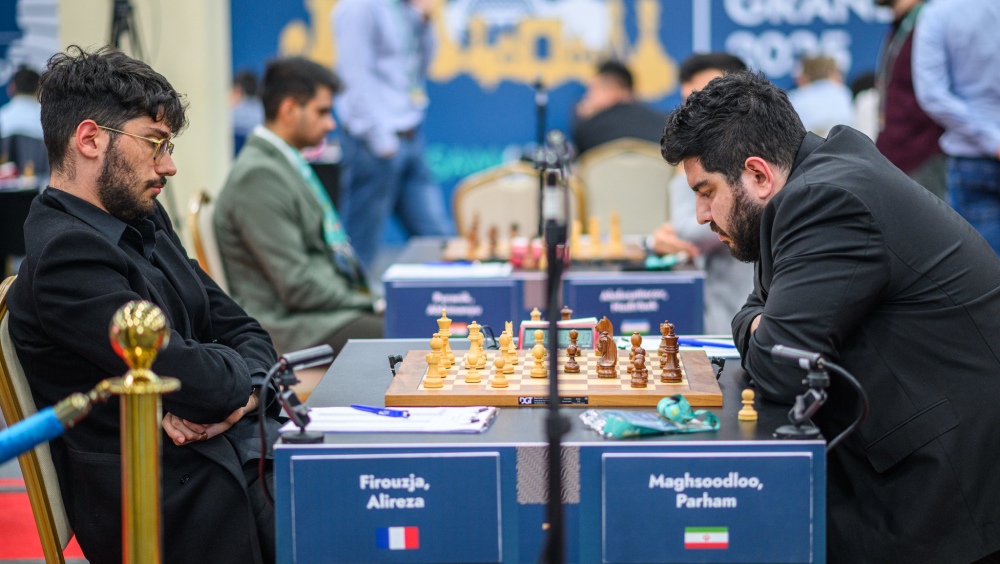
After five hours and 45 minutes of tension, Parham Maghsoodloo outlasted Alireza Firouzja to take the sole lead in the tournament. In the women’s event, Vaishali Rameshbabu – despite being down to her final minute – played fearlessly and defeated Olga Badelka to claim the top spot. It was a long day in Samarkand, with many of the top games stretching late into the evening. If there was a theme to Day 3, it was concentration – or lack of it – as several decisive matches were decided by blunders in tense, balanced endgames. The main duel of round three in the Open took place on board one, where France’s Alireza Firouzja faced his former compatriot Parham Maghsoodloo in the battle for the lead. Playing the Najdorf, the two transitioned to a complicated endgame, where Black had a slight advantage thanks to a pawn chain in the centre and two bishops. However, at some point Maghsoodloo miscalculated and lost a pawn, allowing Firouzja to equalise. White has almost complete domination on the queenside, but his g4-pawn is lost. If he’s not careful, Black can be just in time to win the race to promotion. The only option for White here is to put his rook on the eighth rank and go with checks: 43.Rb8 Rxg4 44.Rf8+ Ke6 45.Re8+ Kd7 46.Ne5+ Kxe8 47.Nxg4. Instead, after more than five hours of play, Firouzja made a fatal error with 43.Rb6?? This immediately loses: 43…Bxb6 44.axb6 Rh7! 45.c4 Rd7! Cutting off the white king from the kingside. 46.Nb4 White is forced to pull back his knight and try to stop Black’s advance on the kingside. 46…f3 47.Nd3 Ke7 48.c5 Rd8! 49.c6 Kd6 Right on time to squash any hopes for Firouzja. 50.c7 Re8 51.Kc3 Kc6 White resigns, 0-1. A crushing blow to Firouzja in the first high-stakes clash of the tournament. A crushing blow to Firouzja in the first high-stakes clash of the tournament. In another tense and long game, Arjun Erigaisi defeated Anton Demchenko in the Petroff Defence. On two occasions in the endgame, Erigaisi had a significant advantage but failed to capitalise. But when Demchenko gave him a third chance, the Indian took it: White has just played 61.c6-c7. According to chess engines, the position is even. After 61…Rb1+ (or 61…g5) 62.Nb5 g5 63.Rxg7 g4 64.Rxg4 Rxb5+ 65.Kxb5 Kxc7 all pawns would have been removed and Black would have been left with a knight against a rook, sufficient for a draw. However, Demchenko instantly blundered with 61…Rc4?? After 62.Nb5! Black has to give up his rook to avoid checkmate. The last two games on the top boards – lasting well into the seventh hour – saw Abdusattorov and Praggnanandhaa emerge as victors. Praggnanandhaa won against the resilient veteran Boris Gelfand in a fierce queen and rook endgame which could have gone either way. Abdusattorov had a commanding position from the middlegame, but his opponent Abhimanyu Puranik put up a fierce and long fight. World Champion Gukesh D continued in strong form on Day three. Playing as Black, he defeated Daniil Yufa. In the Ragozin, White mixed up his preparation and ended up a pawn down as early as move seven. After three rounds, Parham Maghsoodloo is on three points, followed by six players on 2.5/3. One of the sharpest games of the round was played between Robert Hovhannisyan and Vladimir Fedoseev. In the Scandinavian Defence, White managed to get a slight edge by holding more initiative on the board, but early middlegame complications led to a tactical position with White making a daring sacrifice: It’s unusual to see white pawns on the sixth rank this early in the game. Black should have removed one threat by taking on c6. Instead, Vladimir took the bait with 19…Qxe2, after which he was punished effectively. 20.Rfe1! Offering another sacrifice. 20…Bxe1 21.Rxe1Qb2 22.Rxe7 Be6 23.Nd4 Qb1+ 24.Kh2 g5 Opening a space for his queen to help the black king. 25.Qe5 Qg6 It’s hard to believe that White is down in material here, given his dominance across the board. The strongest move in the position was 26.Nf5. In case Black plays 26…Bxf5, then he’s checkmated after 27.Rxe8+ Rxe8 28.Qxe8#. Instead, Black would have to play 28…Rf8 and after 29.Rxe6, he could not defend the knight coming to e7 with a double attack on the king and the queen. Hovhannisyan instead went for a different line with: 26.cxb7 Rab8 27.Nc6 Nd5 28.Rxe8 Rxe8, but now he missed the winning move – Ne7+! Instead, he played 29.d7?! Which still was enough to win in a knight endgame that emerged after 29…Nxd7 30.B8=Q Qxh6 31.Qxe8+ Bxe8 32.Qxe8 Kg7 33.Qe5+ Qf6 34.Qxf6+ Kxf6 35.Nxa7. Eventually, White’s a-passer tipped the balance in his favour. The Women’s event In the Women’s tournament, only two players had a perfect score after the first two rounds: the 2023 Grand Swiss winner Vaishali Rameshbabu and naturalised Austrian Olga Badelka. In a direct duel for first place, Vaishali defeated Badelka in a sharp line of the Pirc Defence. This is the crucial part of the game. The position is extremely complicated with threats on both sides. Only 24 moves have been played, but Vaishali had a minute on her clock, while Badelka had six. Moments like these distinguish the real champions. Despite being desperately low on time, Vaishali chose the strongest move, a breakthrough on the kingside – 25.g4 – even though it led to serious complications. Black has to respond; otherwise, the pawn will advance and endanger her king. 25…fxg4 26.hxg4 Now it was Badelka’s turn to play sharply. The best option was 26…h5 – opening her king and directly challenging White. She stopped for a while to think, but it seems Badelka was tempted by White’s time trouble, and she leapt directly into a blunder – 26…Nfxd5?? White was now completely winning, and Vaishali didn’t miss her chance. After 27.Nxd5 Nxd5 28.Rxd5, Black could not recapture: 28…Qxd5 fails to 29.Ng6+! hxg5 30.Qh4+, winning the queen. 28…Bxb2 29.Rh5! Black is now completely lost. With an
FIDE launches pilot project to test “Fast Classic” for standard rating

The FIDE Council has approved a pilot project introducing tournaments with shorter time controls that will count toward the standard rating list. Current requirements Under existing regulations, the minimum time control for a game to be rated as standard depends the players’ ratings, assuming the game lasts 60 moves: If at least one player is rated 2400 or higher: 120 minutes per player If at least one player is rated 1800 or higher: 90 minutes per player If both players are rated below 1800: 60 minutes per player Pilot events As part of the pilot project, three tournaments will be played with a time control of 45 minutes plus a 30-second increment per move (starting from move one) and their results will count toward players’ standard ratings: Qatar Cup (September 7–13) QCA Training Center September Tournament Classical (September 25–27) Women’s World Team Championship (November 17–24) These events will follow standard-rating rules, but with specific conditions: No title norms will be awarded. Organizers may not schedule more than two rounds per day Why “Fast Classic”? The initiative responds to a growing demand from players and organizers to recognize “fast classic.” In modern life, time is increasingly limited, and there is a clear trend toward shorter formats that remain serious and competitive. The original idea was proposed by Oleg Skvortsov, a chess patron, organizer of the Zurich Chess Challenge 2012-2017, who suggested events with rounds lasting 2–3 hours — making it possible to hold two rounds in a single day. Next steps FIDE recognizes of the importance of this matter and is approaching it with due responsibility. The pilot events will serve as a real-world test case. After their conclusion, FIDE will conduct a thorough analysis of the outcomes and gather feedback from the participants before making a decision on further implementation.
FIDE Grand Swiss 2025, Day 2: Blunders and comebacks as favourites regroup
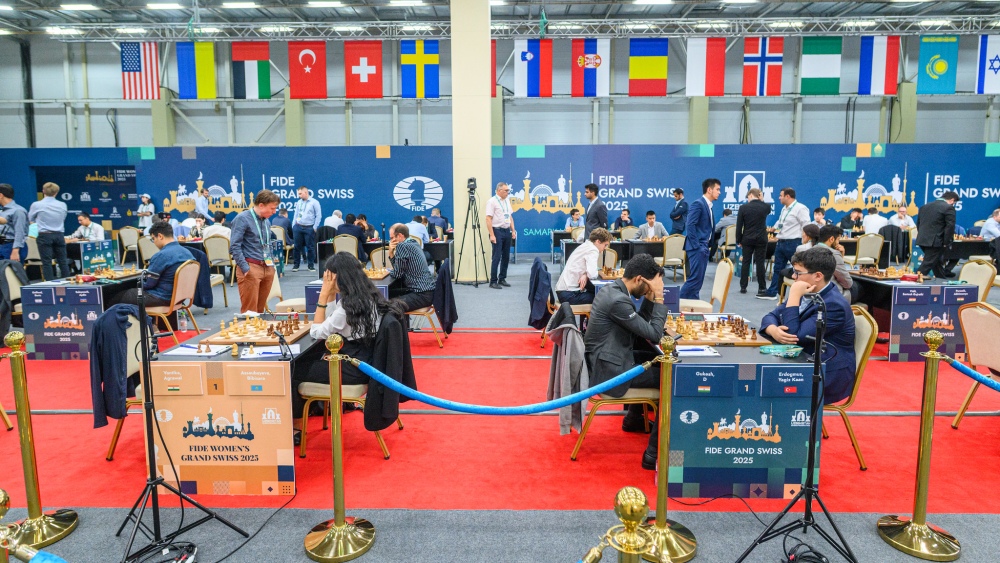
Day two of the FIDE Grand Swiss delivered more drama as the favourites were put to the test. World Champion Gukesh D was held to a draw by 14-year-old Turkish prodigy Yagız Kaan Erdogmus, while fellow favourite Arjun Erigaisi survived a near-loss to defeat Haik Martirosyan. In the Women’s event, several top players who stumbled at the start staged a strong comeback, but surprises continued to shake up the standings. The day’s drama began on the top board, where Uzbekistan Chess Federation Vice President, Komil Sindarov, made the ceremonial first move in the game between Gukesh and the world’s youngest Grandmaster, Erdogmus. It was exactly this game that opened with a surprise as early as move two. After 1.d4 d5, Gukesh played the unusual 3.c3 aimed at throwing him out of his preparation. Commenting in the live broadcast on FIDE’s YouTube channel, English IM Jovanka Houska branded the move as “anti-youngster”, hinting at the attempt to thwart the deep and excellent opening preparation very young players such as Erdogmus excel nowadays. The odd thing is that both players in this game are youngsters – Gukesh is 19 and Erdogmus 14. The World Champion got the initiative across the board and was notably better for the most part, but then he let it slip. White has an extra pawn, a chain in the centre, and a pin on Black’s a-runner. On top of that, Black played the last 10 moves in severe time trouble. Gukesh now plays a seemingly logical move which, however, backfires and completely wipes out his advantage. 40.Bxg5?? Instead, Gukesh should have opted for 40.Nf6, forcing Black to take – 40…Bxf6 and after 41.Bxh6! Bg7 (41…Rf7 fails to 42.hxg6 and Black is lost) 42.Bxg7 Rf3 43.h6 Rh3 44.e6 White is slowly but surely advancing his pawns to victory. However, the move played by Gukesh allowed Black to equalise. 40…Kxd5! 41.Bf6 gxh5 42.Rg7 trying to attack via the back ranks. But now 42…Rxf6 43.exf6 Re2+ and Black delivered perpetual check. ½ – ½ Erdogmus’ persistence in defending and withstanding pressure even with seconds on the clock paid off. The sharpest game among the top boards was played between India’s Arjun Erigaisi and Armenia’s Haik Martirosyan. Playing as Black, Erigaisi was on the brink of defeat on move 23. With his king exposed and pieces trapped on the queenside, Black is in severe trouble. However, White missed the best continuation and, in several moves, Black turned the tables. 24.Kh1?! 24.Ra2 with the idea of bringing the rook to the attack on the kingside was a better choice. 24…Nd7 25.Qf3 Nc5 26.Rb1 After a few hesitant moves White is now defending and shuffling, losing the advantage. A few moves later, with both trading advantages along the way, the following position emerged on the board: Instead of the natural 32.Qxg6+ Ng7 33.Bg5 with a roughly equal position, Haik played 32.Rf1?? giving Black a chance to get the upper hand. Black should have responded with 32…Ra7, bringing the rook to action and protecting the seventh rank. Arjun, however, played 32…Nxe5?? And the position was even again. Later down the line, White misplayed one more time and had to give up a piece. Erigaisi still had to be careful, but ultimately converted his advantage into a full point. Following a draw in round one, rating favourite Praggnanandhaa defeated Ivan Zemlyanskii, after Black overlooked a tactical subtlety. Black should have played 30…e6 here, to open a retreat route for his bishop in case of c4-c5. Instead, he played 30…Rc7? with fatal consequences. 31.c5! Bxc5 No other choice as bxc5 means the a5-knight will fall. 32.Bxc5 Rxc5 33.b4 fork. Black resigned. 1-0 In other developments among the leaders, Alireza Firouzja defeated Maxim Rodshtein on board two. The 22-year-old naturalised Frenchman played confidently, gaining the initiative and creating a passer on the a-file which White could not stop. Iran’s Parham Maghsoodloo is also on two points, after overcoming Spain’s David Anton. Local hope Nodirbek Abdusattorov played a challenging positional game as Black against Svane which ended in a draw. In a surprise of the round, seasoned heavyweight Alexander Grischuk lost as White to Chilean GM Cristobal Villagra after blundering in time trouble. The Women’s tournament The winner of the 2023 Women’s Grand Swiss, Vaishali Rameshbabu, continued strongly – she defeated Dutch champion Eline Robers with black pieces in just 22 moves. Vaishali played a rare line in the Morphy Defence in Ruy Lopez and White couldn’t counter. Here, in already inferior position White played 12.Nxf5? Instead of continuing development with 12.Nd2 she has accepted battle without being fully developed. 12…d5 Black wastes no time and strikes in the centre. 13.Bb3? after this mistake White’s position is beyond repair. Eline had to return the knight to d4 although after simple 13…dxe4 her position is no fun. 14.Nxf5 15.exf5 Bxf5 16.Bxd5+? Further digging herself in. The rest was a smooth sail for Black. White resigned on move 22 facing an imminent checkmate. In a big duel of the round, former World Champion Mariya Muzychuk defeated the seasoned player from Moscow, Valentina Gunina. The position was even until the early stage of the middlegame where Gunina blundered and from then on everything went downhill for her. A swift and convincing comeback by Mariya against a strong player is what she needed after losing on day one. Tan Zhongyi also made a quick comeback today, after starting the tournament with a loss. The former Women’s World Champion was victorious against Lina Nassr. In the Delayed Alapin variation of Sicilian Defence, Tan – playing as White – won a pawn early in the middlegame and gradually gained control across the board, resulting in her victory in 30 moves. Austria’s Olga Badelka outplayed Zsoka Gaal with black pieces on board four. With two points, the young player originally from Belarus has shown she is well prepared for this event. European Champion Teodora Injac also won, bouncing back after a loss in round one. One of the favourites in the event, Anna Muzychuk,

